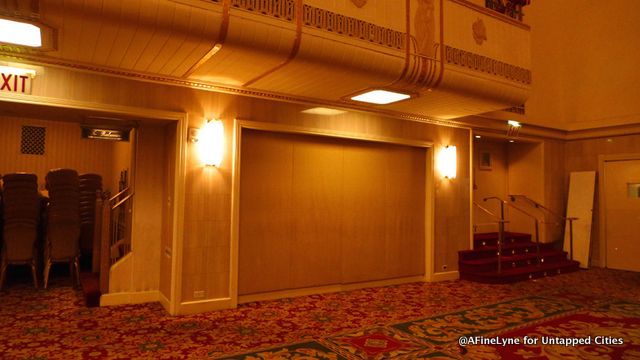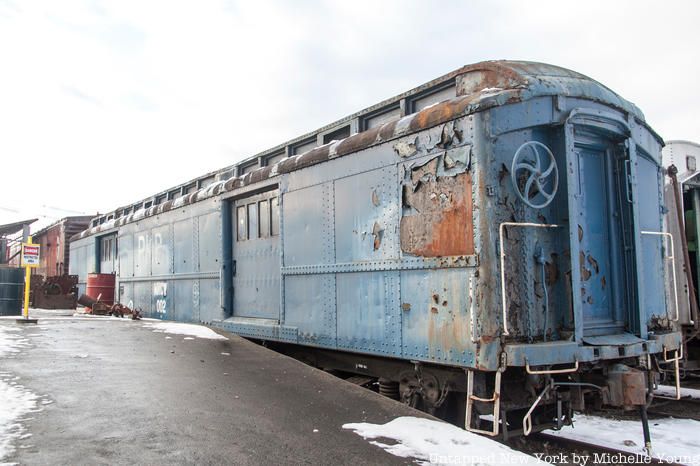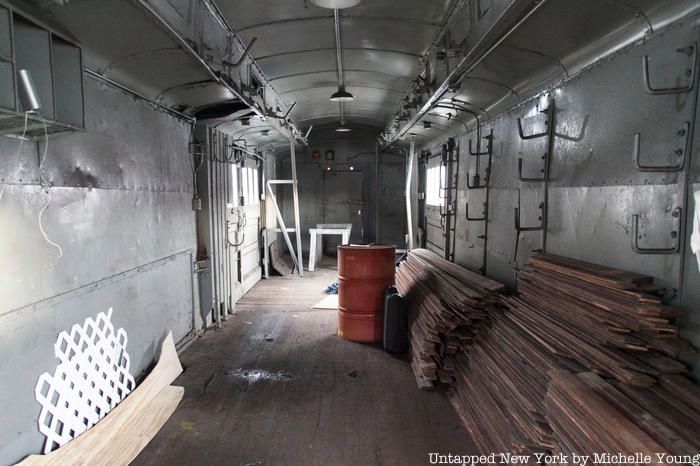Last-Minute NYC Holiday Gift Guide 🎁
We’ve created a holiday gift guide with presents for the intrepid New Yorker that should arrive just in time—


New York City legend has imbued the abandoned Track 61 in NYC at Grand Central Terminal with a storied history full of clandestine government movements and illicit affairs. While Untapped New York has busted what may be the biggest myth of Track 61 (the story that the abandoned train car which sat on the track for decades belonged to President Franklin Delano Roosevelt), there is some truth behind the legends. Here, let’s take a look at the fact and fiction surrounding the infamous track 61.
Track 61 and Track 63 at Grand Central Terminal were originally built to carry freight and serve as loading platforms for a steam powerhouse that once existed on 49th Street. The powerhouse served Grand Central Station and other buildings in the immediate area. When the Waldorf-Astoria Hotel purchased the air rights above these tracks in 1929, it also acquired the track below. The obsolete steam powerhouse was knocked down along with other buildings on the site including the Central Y.M.C.A and The American Express Building. A New York Times article from September of that year announced that the hotel would feature “a private railway siding underneath the building,” where “guests with private rail cars could have them routed directly to the hotel.” A railway siding is a low-speed track that is separate from the main branch and built to handle less traffic.
The first person to reportedly make use of this private station was General John J. Pershing in 1938. A New York Times article from April 1938 describes Pershing’s arrival via “a special railcar…shunted to a ramp under the Hotel Waldorf-Astoria that had never been used before.” Pershing then proceeded into an elevator and made his way into the hotel. It is unclear whether the elevator led directly into the hotel, though most likely it didn’t. In an article for Trains magazine in April 2012, Karl Zimmerman wrote that there was an ‘auto lift’ on the 50th Street side of the Waldorf which served the basement, ground level, and floors 1 through 3, but that elevator had no access to the railroad. It was used to bring automobiles into the ballroom for shows.

So the hidden track really was used by hotel guests looking to make a discreet entry into the hotel, but where does FDR fit in? There is only one documented occasion on which President Roosevelt made use of Track 61. The incident occurred on October 21, 1944 when Roosevelt made a campaign stop in New York City. A Secret Service memorandum from that visit states “At 10:05 p.m., the President will leave the hotel over the same route he entered, i.e., via east side Lexington Avenue elevator, and will then proceed via New York Central elevators to the New York Central Rail[road] siding, located in the basement of the hotel.” According to William D. Middleton in his 1977 book Grand Central: the World’s Greatest Railway Terminal, FDR “descended into the ‘basement’ to the presidential rail car for the journey home to Hyde Park.”
Despite the 1944 departure being Roosevelt’s only documented use of the track, the late president became synonymous with Track 61, which was often referred to as the “presidential siding.” The largely reported myth about FDR and Track 61 in NYC was that his personal railcar sat abandoned at the track since 1945. Riding in his bullet-proof Pierce-Arrow limousine, the story goes, the president would be driven directly into his own train car and shuttled to Track 61. Once beneath the Waldorf Astoria, the limousine would emerge from the railcar, onto the platform and be carried via elevator directly into the Waldorf-Astoria Hotel. These measures were taken to hide the former president’s symptoms of polio. On Untapped New York’s visit to the Danbury Railway Museum, where the train car was recently relocated to, we busted this myth and found out that the car which had been sitting on Track 61 all these years was actually baggage car MNCW #002. It would have taken quite a bit of maneuvering to fit a Pierce-Arrow limousine through its doors.

While the FDR car myth doesn’t hold up to scrutiny, Track 61 in NYC does have at least one more presidential connection. Every president from Herbert Hoover to Barack Obama has stayed in the Waldorf Astoria’s presidential suite, so it’s not much of a leap to think they may have entered via a secretive entrance. According to an article in The New York Post, the track was used as an “escape option” by the Secret Service for President George W. Bush, Secretary of State Colin Powell, and National Security Adviser Condoleezza Rice in 2003 while in meetings for the U.N. General Assembly, though the article has no named sources for this information.
The subterranean siding was used sporadically throughout mid-20th-century by various high-profile figures and for the occasional events. Two of the most notable uses made the news in the 1960s. In 1961, the New York Times reported that “a siding under the Waldorf-Astoria Hotel” was the location of a documentary film shoot about the “Redcap Preacher” Ralston C. Young. For years, Young led lunchtime prayer meetings, usually on Track 13. In 1965, Tack 61 was in the news again, this time as the location of a premiere party hosted by Andy Warhol. The location “two stories under the Waldorf-Astoria” was described as being “a pretty low place for a party, even if it is catered by the Waldorf. Any way you slice it, a party in a railway siding is a party in a dingy hole.” This “dingy hole” was visited that night by the likes of Edie Sedgewick, art patron Huntington Hartford, and other members of New York society.

Track 61 in NYC, which was never intended for passenger service, is no longer in use. You can catch a glimpse of the legendary track while riding the Metro-North out of Grand Central Terminal, though the signifying blue railcar is no longer there. Track 61 is one of many secret locales Untapped New York has uncovered in our years of exploring New York City. Join us as we reveal the most surprising secrets of Grand Central Terminal on one of our upcoming walking tours! Please note that our walking tour does not access Track 61.
Next, check out 10 Hidden Place in NYC’s Grand Central and August Belmont Jr.’s Private Subway Car!
Subscribe to our newsletter